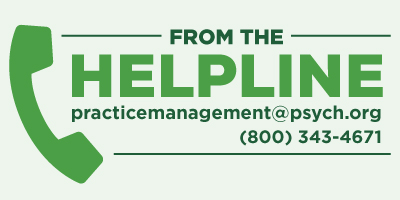Not a Medicare Provider? Time to Rethink That Decision
Abstract
APA’s Practice Management Helpline is hearing more complaints about commercial insurers than Medicare. If you are not already a Medicare provider, you may want to reconsider—which is especially important with the aging of the U.S. population.

Although APA’s Practice Management HelpLine often assisted APA members in the past with their Medicare administrative problems, in recent years Medicare appears to be one of the more dependable payers for psychiatric care. Hence, I’d like to remind APA members how Medicare works and the ways they can be involved with caring for its beneficiaries.
In the early days of Medicare, all physicians were considered to be part of the program simply by seeing a Medicare beneficiary. Medicare had a fee schedule for all covered services, but if the amount on the schedule was below providers’ standard fee, they were permitted to bill patients for the balance. In 1992 the rules changed, and balance billing was no longer permitted.
Medicare created two categories of providers who must be enrolled in the program: participating and nonparticipating. Participating providers “accept assignment” of Medicare fees and are reimbursed the allowed amount for their services; patients pay only the defined copay. Nonparticipating providers are paid directly by patients and are allowed to charge what is called the limiting fee, or 109.25% of the allowed reimbursement for participating providers. Medicare reimburses patients at a lesser percentage of the fee, and they must pay the difference out of pocket. Both categories of providers are required to file Medicare claims for their patients.
In 1998, in response to concerns that physicians were unwilling to care for Medicare patients because of the limits of the fee schedule, Congress passed legislation creating a third legal status with Medicare—opted out. Being an opted-out provider means that for a minimum of two years Medicare will not reimburse a provider or a patient for any rendered care (unless they can clearly be deemed emergency services). Originally providers had to opt out every two years, but in 2015 this policy was altered to automatically renew providers’ opt-out status for another two years unless they notified their local Medicare Administrative Contractor in advance to change their status back to participating or nonparticipating. Providers cannot be opted out if they work in an academic or clinical setting where they are expected to provide care to Medicare beneficiaries as part of their employment since being opted out applies to all places of service.
If you have never enrolled in Medicare under any of these statuses, you are not obligated to select an official Medicare status, but you may encounter difficulties if you have none. Long-time patients may age into Medicare and become Medicare beneficiaries without your realizing it, and there are always patients who don’t realize they’re Medicare beneficiaries. The APA Practice Management HelpLine has heard from a number of members who’ve been notified by Medicare that patients have filed claims for care they provided and have been asked to provide information about their status with the program. If you have been charging these patients beyond the Medicare limiting fee, you must return any overage to them.
Although the HelpLine has heard from a number of members who are concerned about the administrative hassles of being a Medicare provider, practices with fewer than 10 full-time employees are considered small practices and don’t have to use electronic health records or comply with various Medicare quality improvement programs that can sometimes be onerous. They can even continue to file claims with paper Form 1500s. Since we’ve been hearing more from members about problems with commercial payers than with Medicare, this may be a good time to enroll in Medicare.
You can find the current Medicare allowable fee schedule on the website of your area’s Medicare Administrative Contractor. A list of contractors is posted on APA’s website.
If you have questions about Medicare, email them to [email protected] or call (800) 343-4671. ■



